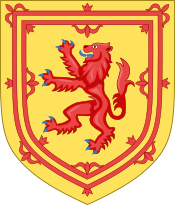Baptist Union of Scotland
The Baptist Union of Scotland is the main association of Baptist churches in Scotland.
| Baptist Union of Scotland | |
|---|---|
| Classification | Protestant |
| Orientation | Baptist |
| Polity | Congregationalist |
| Associations | European Baptist Federation |
| Region | Scotland |
| Origin | 1869 |
| Congregations | 161 churches |
| Members | 12,000 people |
| Ministers | 175 |
| Official website | http://www.scottishbaptist.com/ |
| Part of a series on |
| Baptists |
|---|
 |
|
Background |
|
Organizations
|
History
From the 1650s to 1869
Baptists first arrived in Scotland with the armies of English republican Oliver Cromwell in the 1650s, who established small churches in Leith, Perth, Cupar, Ayr and Aberdeen, but they did not survive for long, partly because of their association with Cromwell (who was generally not welcomed in Scotland), but more especially as a result of strident and often violent opposition instigated and inspired by the Church of Scotland and the Parliament of Scotland which it controlled. Baptists later emerged in the 18th century—in 1750 at Keiss, where the leader was William Sinclair and the church was established on the English Baptist pattern. The group who in Edinburgh came to Baptist convictions in 1765 under the leadership of Robert Carmichael and Archibald McLean became known as Scotch Baptists. Like other Scottish Protestant Christians of the time they were very conservative and adopted the opinions of a particularly strict form of Calvinism. Somewhat later, a different form of Baptist witness emerged, this time influenced by the Haldane brothers, James Haldane and Robert Haldane evangelical preachers who came to Baptist convictions around 1808. Along with the English Baptists, they were distinguished from the Scotch Baptists by their more moderate and less Calvinistic attitudes. After overcoming initial hostilities, all these groups were able to unite in 1869.
1869 to the present day
The Baptist Union of Scotland was founded in 1869 with 51 churches in its membership, which represented almost 4000 members. There are currently 161 churches in the Union, with around 12,000 members (however, not every church that adopts the label 'Baptist' is part of the Baptist Union of Scotland).
The Baptist Union of Scotland is served by a national team comprising Rev Martin Hodson (General Director), Rev Dr Jim Purves (Mission & Ministry Advisor), Rev Peter Dick (Finance Director), Rev Frances Bloomfield (Convenor), Rev Andrew Clarke (Continuing Ministry Development Lead), Rev Ali Laing (Next Generation Development Coordinator).[1]
These leaders are responsible for the development of strategic initiatives and oversee the work of the Board of Ministry Ministry and Mission Initiative Group, as well as providing administrative support to local churches. The Union's main function is to service the churches, supporting them in mission and ministry developments. The Union also accredits ministers for leadership within Union churches. The ultimate decision making body within the Union is the annual Assembly attended by delegates from each of the member churches. In between Assemblies a Council exists to ratify decisions and generally be available for consultation from the Core Leaders.[2]
BUS maintains strong links with other Baptists in the British Isles, notably the Baptist Union of Great Britain (which despite the name is the association of Baptist churches in England and parts of Wales), the Baptist Union of Wales, the Irish Baptist Networks and BMS World Mission. Together, these five groups form the Fellowship of British Baptists. Additionally, BUS is in membership with the European Baptist Federation and the Baptist World Alliance.
Beliefs
Unlike some denominations, the Baptist Union of Scotland exercises no control over local churches (in fact, many Baptists would argue that "Baptist" is not a denomination at all, as that term implies central control and hierarchical leadership). Scottish Baptists emphasise the responsibility of each local church to deal with its own life and affairs, whilst stressing the importance of a network of interdependence with other churches within the Union, in pursuing together our Union's principles and objectives. Practices and doctrinal emphases can vary from one church to another. All churches in the Union must accept the "Declaration of Principle of the Baptist Union of Scotland"[3] which is:
"The basis of the Union is:-
- That the Lord Jesus Christ our God and Saviour is the sole and absolute Authority in all matters pertaining to faith and practice, as revealed in the Holy Scriptures, and that each Church has liberty, under the guidance of the Holy Spirit, to interpret and administer His laws.
- That Christian Baptism is the immersion in water into the name of the Father, the Son and the Holy Spirit, of those who have professed repentance towards God and faith in the Lord Jesus Christ, who died for our sins according to the Scriptures; was buried and rose again the third day.
- That it is the duty of every disciple to bear witness to the Gospel of Jesus Christ, and to take part in the evangelisation of the world."
Footnotes
- http://www.scottishbaptist.com/contact-us
- Baptist Union of Scotland Constitution
- Quoted here from Baptist Union of Scotland Year Book, 2008
See also
References
- Wardin, Albert W., ed. (1995) Baptists Around the World: a comprehensive handbook. Nashville, Tenn: Broadman & Holman ISBN 0-8054-1076-7
- McBeth, H. Leon (1987) The Baptist Heritage: Four Centuries of Baptist Witness. Nashville, Tenn: Broadman Press
- Murray, Derek Boyd (1969) The First Hundred Years: the Baptist Union of Scotland. Glasgow: Baptist Union of Scotland
- Bebbington, David W., ed. (1988) The Baptists in Scotland: a History. Glasgow: Baptist Union of Scotland
Further reading
- McBeth, H. Leon (1990) A Sourcebook for Baptist Heritage. Nashville, Tenn: Broadman Press
- Talbot, Brian (2014) 'A Distinctive People', Milton Keynes, Paternoster
External links
- Baptist Union of Scotland - official Web Site
- Scottish Baptist College - official Web Site
